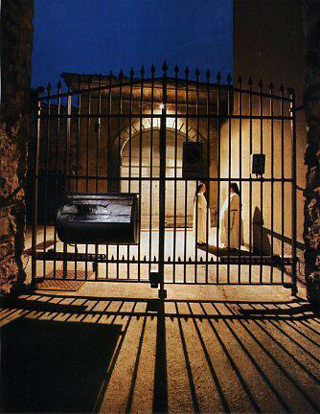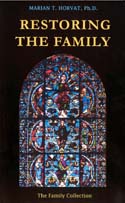 |
Morals
Moral Questions
Unwed Mothers:
The Calvinist and the Catholic Answers
Fr. Paul Sretenovic
For quite some time, I have been meaning to respond to the issue that one of the visitors to TIA’s website raised concerning what she qualified as the Puritanical or Calvinist nature of my counsel for unwed mothers. This reader also asked me to base my previous advices on written opinions of Catholic authors. The time has arrived for me to address this issue.
First, let me very briefly recap the advice I gave. I affirmed that the unwed mother should be admitted to the Sacraments provided the conditions for their reception are fulfilled. I noted, however, that it is a good tradition of the Church not to admit the unwed mother to the normal social life of the parish (read more here).

No forgiveness for the adulteress Hester in the Puritan world of Hawthorne |
What I advised on this topic is not the moral equivalent to The Scarlet Letter. In that novel, written by the Puritan Nathaniel Hawthorne in the 19th century, a woman found guilty of the crime of adultery was consigned to wear the scarlet letter “A,” for adultery, on her blouse as a punishment for her sin and a reminder to the community that this woman had made herself an outsider permanently. It was meant to humiliate her before society and had little to do with her reformation of character. In that novel, such punishment was presented as a symbol of no forgiveness, no moving on, no peace.
Now, while what I have recommended concerning unwed mothers and social gatherings may bear resemblance to this story, there is an essential difference in the spirit of my counsel.
The Catholic recognizes that through the Sacrament of Confession, the guilt of sin, as well as at least a part of the temporal punishment correspondent to that sin are removed from the sinner’s soul. One can understand how Hawthorne, who did not use this means of salvation, could write as he did in reference to the woman in his novel. For the author, her sin was a sign of her future perdition, revealing that she was not one of the good vessels of clay, but rather one of those worthy of the eternal furnace. This is the Calvinistic understanding of predestination, and the Puritans were members of this sect. The Catholic Church does not have the same view of God or of predestination.
The Catholic Church does not look down on such a woman or expect her to bear the mark of her guilt upon her person, like a cursed woman. But, at the same time, the Church does not deny that the woman must still bear the consequences of her action after Confession, even if she made a perfect Act of Contrition, and would thereby be worthy to enter Heaven if she should die that very moment.
The social situation of the mother and child does not change after Confession and the completed penance; and yes, no matter who has argued to the contrary since I first broached the subject over a year ago, it is an ongoing scandal. Until her situation as a “single mother” changes, it is not advisable the woman should be included in all the normal social life at the parish, e.g. youth groups, etc. An unwed mother can get support from certain more mature members of the parish for her spiritual and temporal needs without appearing ostentatiously for the confusion, and, yes, the scandal of the little ones.
Fr. Jacques Leclercq, Professor at the Saint Louis Institute of Brussels, author of Lessons of Natural Law, indirectly confirms this opinion when he states:
“To admit the illegitimate children in the family, and to put them at the same situation of the legitimate ones, would be to ruin the fundamental institution of the marriage, because the same familial advantages would be obtained without the family by means of illegitimate unions” (1).
What is valid for the family life, proportionally is also valid with regard to Catholic social life in the parish and elsewhere.
Catholic solutions
The presupposition of the three solutions below is that the mother has full right over her child, as has the father. They also have the duty to raise their child well. In principle, they should marry, if the father is still single. But, as almost always happens, the father is either unknown because of the promiscuous life of the mother, or is known but has fled his responsibilities. So, let us face the common case of a single mother alone with her child.
What are the solutions for such a scandalous situation?
The first is marriage. If the woman finds another man of upright character who marries her in the Church and takes her and the child under his custody, her situation is regularized. He covers her shame with his honor and his name.
Leclercq confirms this solution for this irregular mother/child:
“The Church, faithful to her traditional policy in favor of marriage, abandons her rigor when the person repairs the fault. It was a strong rigor, indeed, but one can verify that Canon Law, which aims at the reparation of the disorder as much as for its condemnation, is wide open and favors legitimizing [the illegitimate child] by a subsequent marriage” (2).

Above the Convent Matris Domini in Bergamo, Italy, with a cradle in its grills. It is a modern version of the medieval "turning wheel," installed in all convents and monasteries on the order of Pope Innocent III for receiving undesired babies of unwed mothers - National Geographic, October 2007 |
Another solution for an unwed mother who does not have financial means to provide for her child or cannot bear the moral shame of her situation is to give the child to a Convent or a Monastery. It is the old solution of the “turning wheel,” which, in the Middle Ages, ensured that the Church would look after illegitimate children and make sure they had a healthy moral and intellectual formation. Such wheels are on the return in certain areas of the world, including Germany and Italy, although they are no longer necessarily advisable, given the crisis in the Church and that we are no longer living in a Catholic society.
Adoption is also a possibility for such a situation, provided that the unwed mother is at least reasonably certain that the foster parents will raise the child in the Catholic Faith. The role of the godparents, usually in practice more of a background role, clearly becomes more active and they are required to help the mother fulfill her responsibilities in such a situation. It may even be the case that one or both of the godparents (if they are married, which is often the case) would be in a situation to become the foster parents. That would be ideal.
An important point to remember in these last solutions is that the unwed mother has to overcome her natural affection for her child in order to give the best chance to save his soul.
This separation imposed by charity will go a long way in helping the unwed mother to make reparation for her sin, assuming, of course, that she did sin, and was not violated without her fault.
I do not believe that what the Church recommends regarding the unwed mother is harsh. It is the most charitable way to face what is in fact the harsh reality. When the sin is manifest, the penance has to be manifest.
In this regard, if we recall the example of the early Church, after a person committed a serious sin, there was a long period of time after public penance before the person could return to receiving Holy Communion.
The concern of the Church when she asks for public penance is not only for the person who sinned, but for the whole society. Indeed, first, she makes an example of the sinner for society so that others might not follow the same path. Doing so, she lessens the number of sins committed against God, a holy motive and an obligation for all. Second, the Church helps the sinner to support the necessary penance and teaches the person how to avoid falling into the same errors in the future.
Properly viewed, having a perpetual reminder of one’s misdeeds in the form of public “shunning,” is not cruel, but rather in itself a great mercy to the woman who might thereby bewail her sins for the rest of her life.
This is what the first Pope of the Church did all his life, after the Passion. It is a solid tradition that there were caverns under the eyes of St. Peter caused by the tears that he shed every day for his public thrice denial of Christ. St. Mary Magdalene spent the last decades of her life as a hermit in a cave doing penance for her past sins.
The end of such penance is to move the sinner to increase his union with God, to increase his charity. This Catholic perspective is a far cry from the ostracism of Hawthorne’s Scarlet Letter, and hence, the Puritanical spirit.
1. Jacques Leclercq, Leçons de Droit Naturel, La Famille, Namur: Wesmael-Charlier, 1933, vol. 3, p. 462.
2. Ibid.

Posted April 21, 2008

Related Topics of Interest
 Divorced Parents; Unwed Mothers Divorced Parents; Unwed Mothers
 The Progressivist War against the Family The Progressivist War against the Family
 St. John Fisher and the Divorce St. John Fisher and the Divorce
 Annulments - Comments by Readers Annulments - Comments by Readers
 Vatican II Inverted the Ends of Marriage Vatican II Inverted the Ends of Marriage
 Condoms I: Traditional Catholic Teaching on Birth Control Condoms I: Traditional Catholic Teaching on Birth Control
 Problems of Conscience on Marriages, Live-ins, Baby Showers Problems of Conscience on Marriages, Live-ins, Baby Showers
 The Era of the Child The Era of the Child


|

Morals | Religious | Home | Books | CDs | Search | Contact Us | Donate

© 2002-
Tradition in Action, Inc. All Rights Reserved
|
 |
|